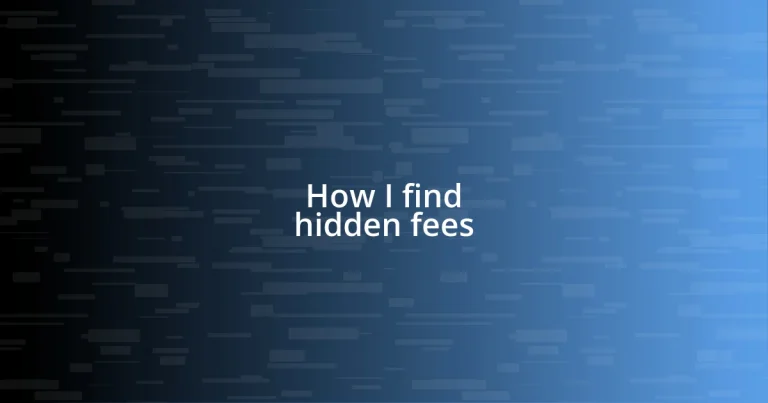Key takeaways:
- Hidden fees are prevalent in subscriptions, travel, and financial services; understanding terms and asking about extra costs can prevent financial surprises.
- Tools such as budgeting apps and invoice review services can help track expenses and uncover hidden charges effectively.
- Proactively questioning fees, reviewing statements regularly, and maintaining organization can empower individuals to manage and prevent unexpected costs.
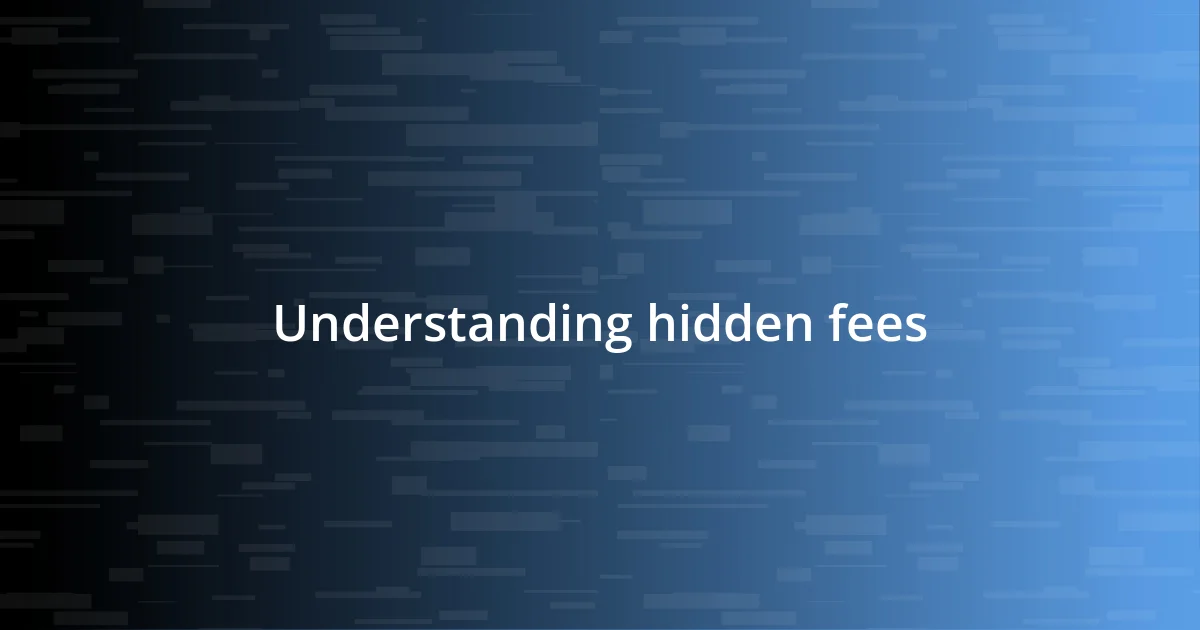
Understanding hidden fees
Hidden fees can often catch us off guard, revealing themselves like unexpected guests at a party. I remember signing up for a new gym, only to discover a hefty registration fee tucked away in the fine print. Have you ever had that sinking feeling when your total comes out far higher than expected?
Understanding these fees requires diligence. I’ve made it a habit to scrutinize all terms and conditions rather than just skimming them, and I often find myself contemplating, “What else might they not be telling me?” Each time I dig deeper, I’m left both surprised and slightly frustrated at the lengths companies go to obfuscate their pricing.
It’s about awareness; hidden fees can be lurking in various transactions, whether you’re booking a flight or signing a lease. A friend of mine learned this the hard way with last-minute credit card charges during a vacation—something I personally try to avoid by always asking, “Are there any extra costs I should know about?” That simple question can save you from many headaches down the road.
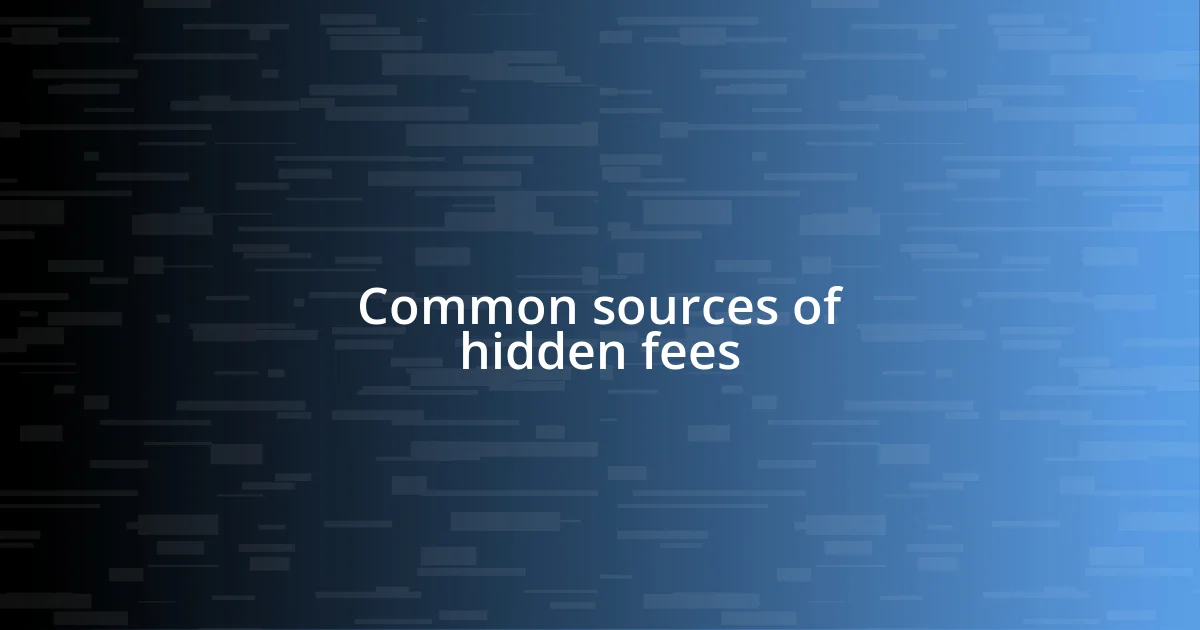
Common sources of hidden fees
When it comes to hidden fees, subscription services often take the lead in catching consumers off guard. I’ve subscribed to various platforms, only to find extra costs sneaking in for additional features or cancellation fees that were only mentioned when it suited them. It feels frustrating to have my enthusiasm for a service spoiled by unexpected financial surprises; I can’t help but reflect on how vital it is to read those lengthy service agreements.
Another common haunt for hidden fees is the travel industry. I once faced an alarming increase in my hotel bill due to resort fees, which were casually listed as “mandatory” on the fine print. Such fees can transform what seems like a great deal into a budget-busting experience, reminding me to always ask upfront about any charges that might pop up. This has inspired me to set a personal rule: I now request a detailed breakdown of costs before booking anything related to travel.
Finally, financial services frequently hide behind baffling jargon and ambiguous terms. I remember a time when I was hit with a late fee on a credit card despite making a payment before the due date; I discovered that my payment was processed just after the cutoff time. This experience taught me how important it is to clarify terms like “payment grace periods” to avoid becoming just another statistic for surprise charges.
| Source of Hidden Fees | Example |
|---|---|
| Subscription Services | Additional feature costs, cancellation fees |
| Travel Industry | Resort fees, baggage charges |
| Financial Services | Late fees, processing fees |
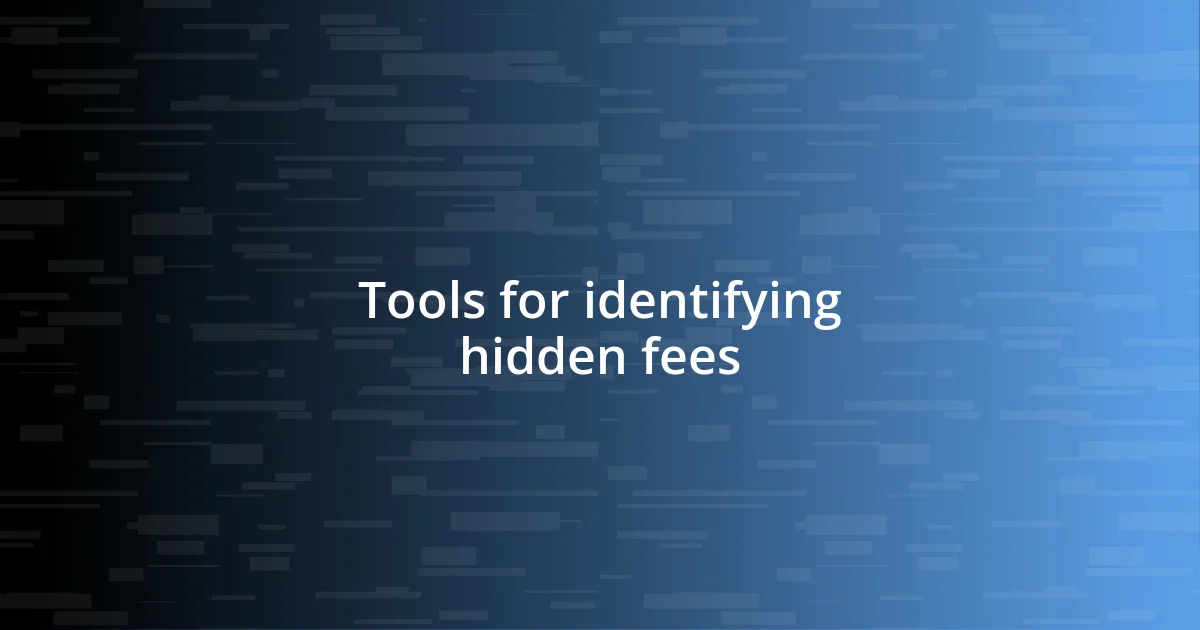
Tools for identifying hidden fees
Identifying hidden fees demands the right tools and strategies to keep these sneaky costs at bay. I often leverage apps and platforms designed to track spending and reveal the fine print of transactions. It’s astonishing how much these tools can uncover; being proactive in my searches has helped me dodge many unnecessary charges over the years.
Here are some tools you might consider:
-
Budgeting Apps: These apps categorize your spending and flag unexpected charges. I personally use one that alerts me whenever a new fee appears, helping me stay informed.
-
Price Comparison Websites: Before making any significant purchases, I’ve learned to visit comparison sites to spot hidden upcharges among retailers. Seeing price variations lets me negotiate better.
-
Invoice Review Tools: Some services can analyze your invoices for hidden fees. I had one friend who saved a significant amount just by having a professional review his service contracts.
-
Credit Card Tracking: Banks often provide features that flag unusual charges on statements. This insight allowed me to catch a duplicate charge before it snowballed.
With technology as an ally, I feel more empowered in my financial choices. It’s like having a personal detective ensuring I don’t fall victim to sneaky fees again!
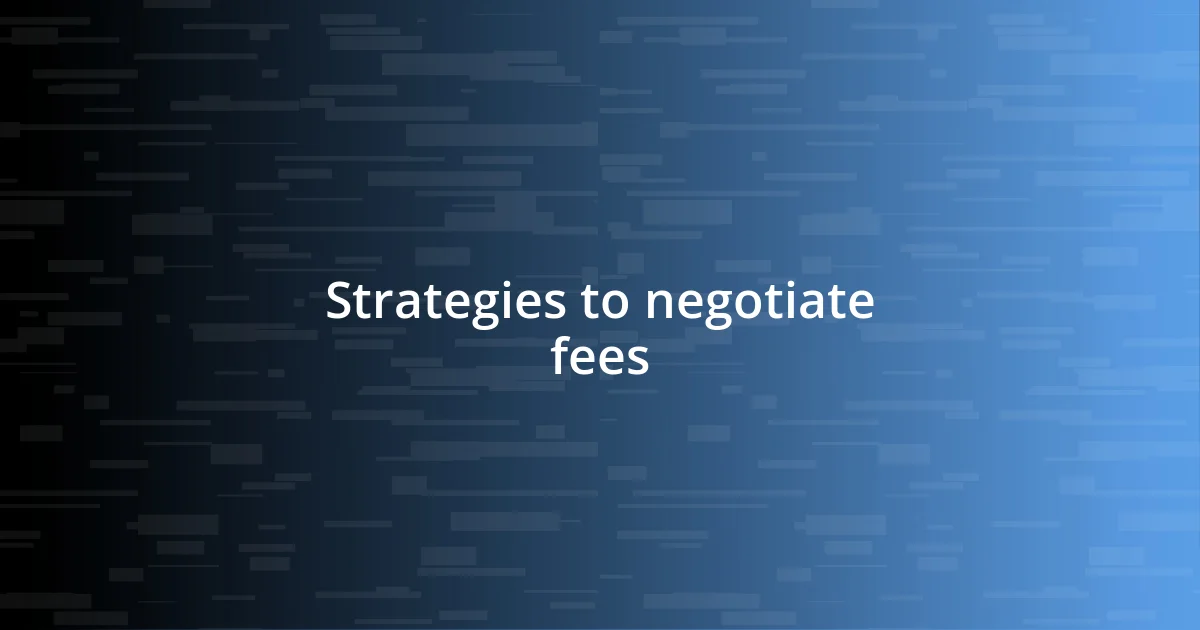
Strategies to negotiate fees
Negotiating fees can feel daunting, but I’ve found that being prepared is half the battle. Before I dive into negotiations, I research comparable services or products to arm myself with valuable insights. For instance, when I was discussing a subscription renewals rate, I discovered competitors offering similar plans at lower prices. That knowledge gave me the confidence to request a better deal, and I was pleasantly surprised when they agreed.
Another strategy I’ve used is to ask questions that reveal potential wiggle room. I remember once chatting with my internet provider about a fee increase. By casually inquiring if any promotions were available, they offered me a discounted rate, as if they were just waiting for someone to ask. This sort of approach not only conveys my interest but also opens the door for negotiation in a friendly manner.
Timing can also play a significant role in negotiating fees. When I asked to waive a late fee on my credit card, I chose a moment right after I had made a successful payment. That glow of achievement seemed to boost my assertiveness. I shared my positive payment habits, which led to a wave of understanding from customer service. They waived the fee, and it felt both rewarding and empowering to speak up.
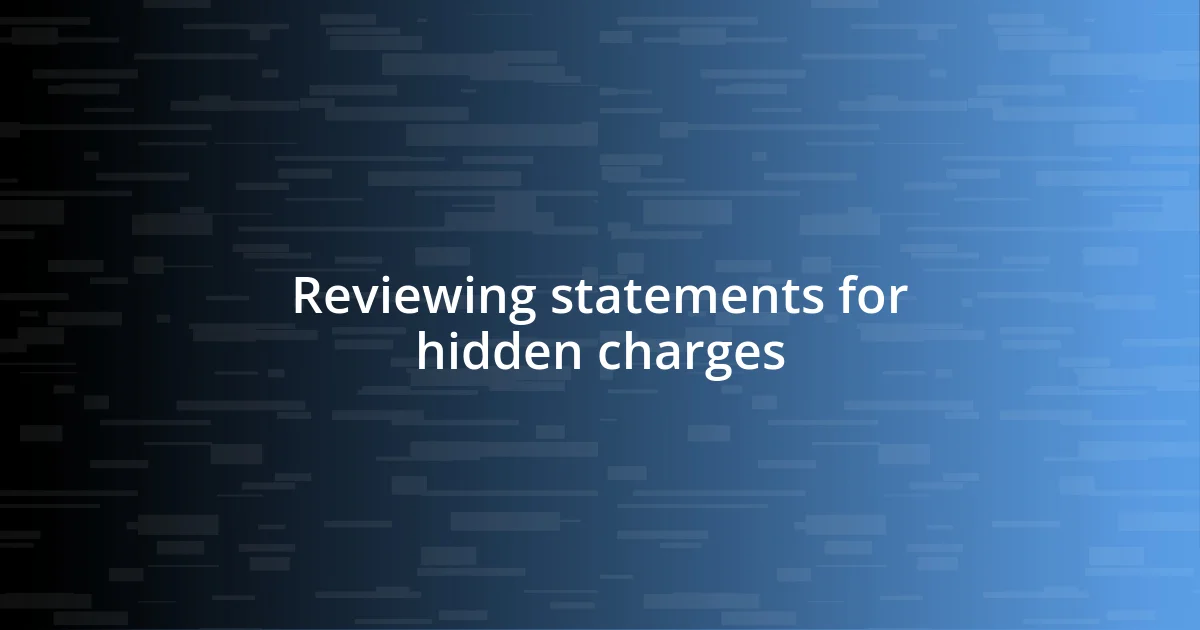
Reviewing statements for hidden charges
I’ve always made it a point to review my bank statements meticulously because hidden charges can slip by unnoticed. Recently, I spotted a dubious monthly charge for a service I hadn’t used in ages. As I dug deeper, I realized it had been recurring for nearly six months! That experience reinforced how crucial it is to not just glance at my statements, but to scrutinize every line item closely. Have you ever caught something similar on your statements?
The beauty of reviewing statements lies in those little surprises—both good and bad. I remember one month, I found a reward credit that I hadn’t anticipated. It felt fantastic to discover that I had earned cash back while I thought I was just spending mindlessly. However, that moment made me appreciate how reviewing statements can lead to uncovering both unnecessary fees and pleasant bonuses.
I suggest taking a systematic approach by marking specific days each month to review transactions. Setting aside time helps me concentrate on my financial activity without distractions. Plus, I’ve developed a habit of making notes next to suspicious transactions; this initial assessment often leads to a call to customer service, ensuring I get clarity. Isn’t it amazing how being proactive can change your perspective on financial management?
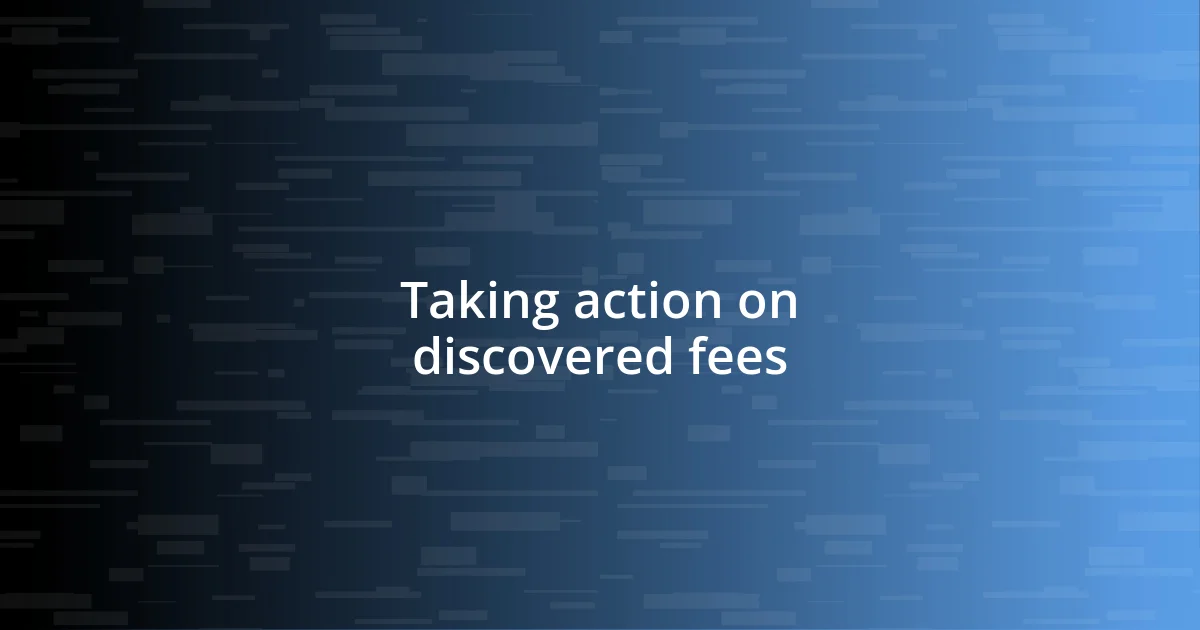
Taking action on discovered fees
Taking action on discovered fees can inspire a mix of frustration and empowerment. When I first confronted a surprise fee on my credit card, I felt that initial sting of anger. However, that feeling quickly transformed into determination as I gathered my documentation and prepared to challenge it. My heart raced as I dialed customer service, but the moment I articulated my case confidently, a sense of control washed over me. It’s incredible how taking charge can shift your perspective.
Another time, I found an extra charge from a gym membership that I had forgotten about. Instead of letting it slide, I resolved to address it head-on. I drafted an email outlining my concerns and requesting a refund. Surprisingly, the gym manager responded warmly, acknowledging the mistake and issuing a refund without hesitation. This experience taught me that advocating for myself can lead to positive outcomes, which is often more emotionally rewarding than I initially expected.
In my experience, staying organized is key when tackling unexpected fees. I keep a dedicated folder where I store statements and any correspondence related to fees. This habit not only helps me to act swiftly but also makes the entire process feel less overwhelming. Have you ever found that you simply need a system in place to manage financial hiccups? Building that structure can lead to a much more empowered approach to your finances.

Preventing future hidden fees
When it comes to preventing future hidden fees, I’ve learned the value of asking questions upfront. I remember once shopping for a new cable package; before signing anything, I made sure to inquire about any additional costs. Surprisingly, the salesperson mentioned a fee for equipment rental that would have caught me off guard later. Isn’t it interesting how a simple question can save you from future surprise charges?
Another strategy I’ve adopted is being mindful of my subscriptions. Periodically, I reevaluate what services I’m still using and which ones I can let go. Just last month, I decided to cancel a streaming service I barely watched. The moment I confirmed that cancellation, it felt liberating to know I’d avoided ongoing fees for something that wasn’t adding value to my life anymore. Have you ever felt that relief when you identify and eliminate unnecessary charges?
Creating a budget has also significantly reduced my exposure to hidden fees. By clearly outlining my monthly expenses, I not only hold myself accountable but can also anticipate any charges before they hit my account. I’ve discovered that sticking to a budget can be quite empowering—the confidence it gives me to make informed decisions is priceless. Do you think having a clear financial plan could help you avoid surprises in the future?












